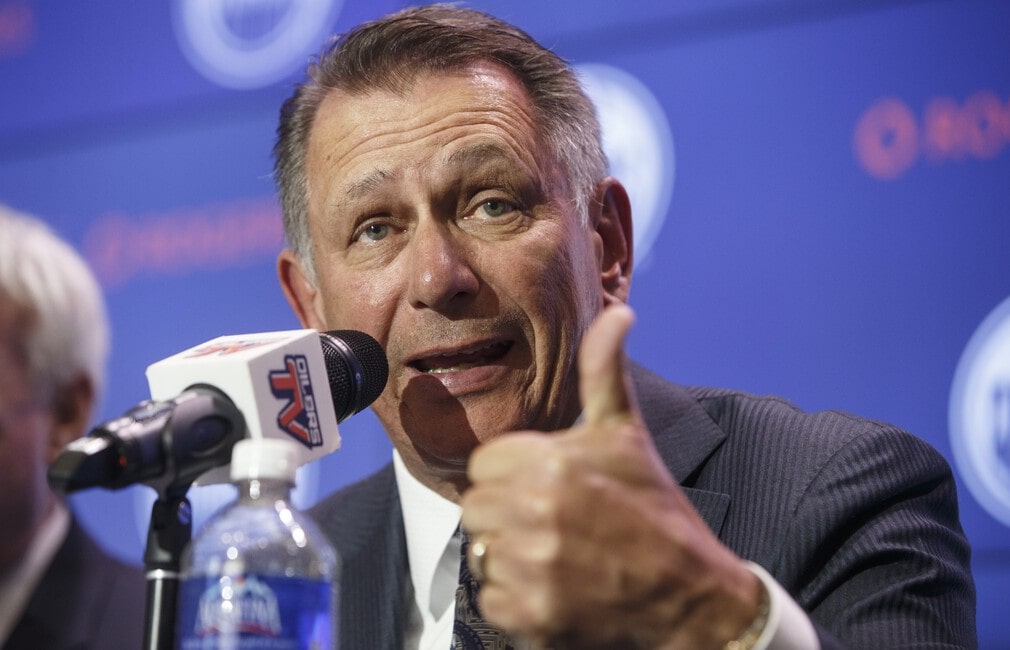The Edmonton Oilers introduced Kris Knoblauch as the team’s new head coach on Sunday afternoon, succeeding Jay Woodcroft. The decision, disclosed by General Manager Ken Holland during a press conference, shed light on the dynamics behind the coaching change. Specifically, it sounds like this move was less about Woodcroft and more about timing.
Oilers Couldn’t Wait Any Longer to Motivate a Change
In a couple of instances, Holland’s remarks indicated that this wasn’t on “Woody” [Woodcroft], but in many ways was on the “win-now” mentality the organization has and the fact that Holland himself left his coach with few options to hold his players accountable.

Given the constraints of the roster Holland himself had constructed, the GM said that ultimately the Oilers weren’t winning under Woodcroft, but he didn’t rule out the possibility that their victory in Seattle could have led to something. Understanding that some will ask if 12 games was a big enough sample size to make this decision, he noted, “we couldn’t wait to find out.” He admitted the decision had been made before the 4-1 win over the Seattle Kraken and rather than deflecting blame entirely, Holland subtly took responsibility for the team’s predicament. Certainly not absolving himself of a level of accountability, his comments demonstrated a certain level of self-awareness in the decision-making process.
It also pointed to the fact that maybe the wrong guy is taking the fall.
What Did Holland Actually Admit To?
During the introduction of Knoblauch, Holland revealed that he explored trade options before resorting to the coaching change. The rationale behind firing Woodcroft, who boasted a commendable winning record, was framed within the context of the team’s in ability to make a different move and that a change was imperative to succeed in the immediate future. Waiting an additional ten games, according to Holland, might have jeopardized their chances of turning the season around.
Knoblauch, drawing from past experiences, expressed a commitment to balance and stability. Recognizing the limitations of implementing extensive changes, when he was asked about accountability, he noted that he could limit ice time or pull players, but he didn’t want them to play in fear that each shift could be their last.
Interestingly, it’s the same predicament Woodcroft was in, because as Holland admitted, moves he made over the summer meant that the roster was at 21 players and not 23, and that limitations with the salary cap meant that the team essentially has to play the players who are healthy. The team, the coach, and everyone involved has little choice in the matter.
This Change Is About Sending a Message to the Core Holland Still Believes In
Holland addressed concerns about inexperienced coaches taking the reins during a crucial season. He expressed confidence that Knoblauch and Paul Coffey — the now assistant coach who said he really didn’t want the job but wanted to help the organization — would lean on the experience of Glen Gulutzan and Mark Stuart. The hope is that the players will respond positively to the change, even if the overall system or instructions remain largely unchanged.
Related: Oilers Make Coaching Changes, Woodcroft Out, Knoblauch In
Coffey’s role as both an assistant coach and advisor to Darryl Katz was discussed during the press conference. While his focus will be on the players for the remainder of this season, beyond that remains undecided. Despite lacking NHL coaching experience, he expressed a willingness to contribute in any capacity that benefits the players.
Regarding Woodcroft’s departure, Holland asserted that he didn’t believe the players had tuned him out, but decisive action was necessary with ample runway left in the season. Jeff Jackson highlighted the proactive efforts of pro scouts working overtime to find ways to help the team win now. It sounds like that will continue, even with the coaching change.
Time Was Running Out for the Oilers
Holland underscored the urgency to win this season, with Jackson emphasizing that players were not directly consulted on the coaching change. Meanwhile, Knoblauch said he intends to run a similar zone defense that was being run under Woodcroft with only slight changes.
This decision was less about getting a new voice, but more about a wake-up call. Since a trade wasn’t on the table — because no team was willing to play ball with only 12 games in the season gone — and Holland wasn’t about to quit (and who knows if that would have directly impacted the players), making a coaching change was the loudest noise that could be made.
